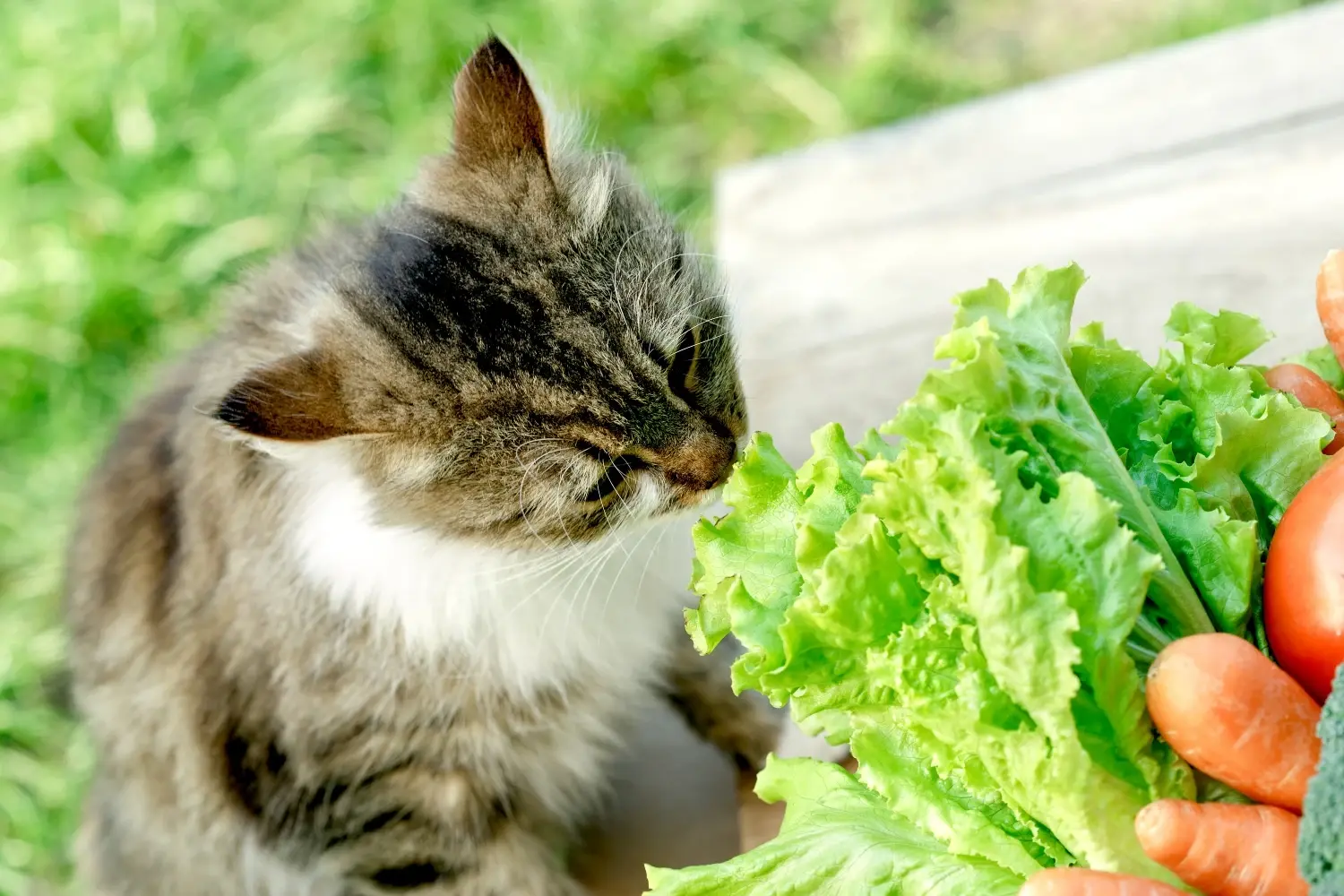
Veganism and plant-based diets are quickly growing in popularity, but is a diet that is suitable for you suitable for your cat too? To find out, we need to ask: Are cats omnivores, and is it possible for a plant-based diet to meet their nutritional needs?
In this article, we will look at the difference between omnivores and carnivores, look into the dietary needs of cats, and take a peek into the world of vegan cat foods to give you all the facts you need to choose the best diet for your feline friend.
Let’s dive in.
What is an Omnivore?
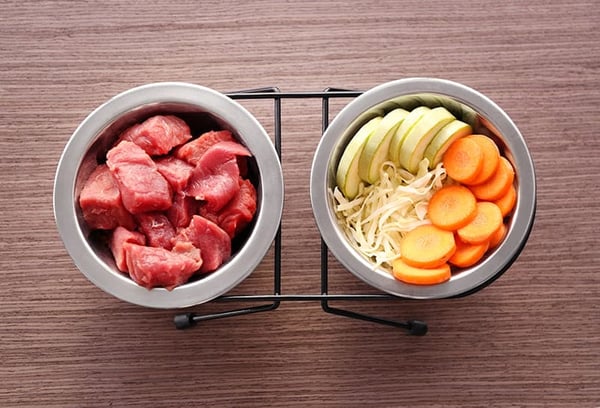
An omnivore is an animal that can survive on both plant and animal sources. You are an omnivore. Bears are omnivores. Omnivores are physically designed for chewing, digesting, and synthesizing nutrients from both plant and animal-based foods.
This is evident in both our teeth and our digestive system. An omnivore has broader, flatter molars to grind and chew plant materials. They also have sharp, pointed canine teeth to allow for tearing flesh.
Most omnivores also produce the digestive enzyme amylase in their saliva to kick-start the breakdown of carbohydrates. Without salivary amylase, the pancreas must work hard to produce enough of the enzyme to break down carbs.
Carnivores do not have the same capacity for breaking down plant materials because they don't produce salivary amylase. They also have sharp serrated molars that slice flesh like scissors, and a wide-set jaw designed to swallow large chunks of meat.
Carnivores have a more acidic stomach environment, too. This allows for faster and more efficient breakdown of meat and even bone.
When comparing the digestive system of an omnivore to a carnivore, there are some obvious physical differences, too.
Omnivores have a smaller stomach capacity and a longer small intestinal tract that allow for the breakdown of higher quantities of plant materials, whereas carnivores have a large acidic stomach that can quickly process animal ingredients and allow for quick digestion through a shorter intestinal tract.
Are Cats Omnivores?
Nope. Cats are not omnivores. They may have adapted to eating plant-heavy commercial pet foods, but that doesn't change their biology.
Biologically, cats are carnivores - obligate carnivores to be precise. This means that some of the nutrients they require can only be sourced naturally from animal protein.
Without animal protein sources in their diet, they would be missing vital nutrients that will negatively affect their health.
Knowing this, we have to question whether or not the emerging trend of plant-based cat diets is actually appropriate. Can cats survive on vegetarian cat food or vegan cat food diet? And if they can, will they thrive the same as they would on a meat-inclusive diet?
The answer is an unsatisfactory one: maybe, but it depends. To help break down both sides of this debate, let’s talk about the unique dietary requirements of cats.
Dietary Requirements of Cats
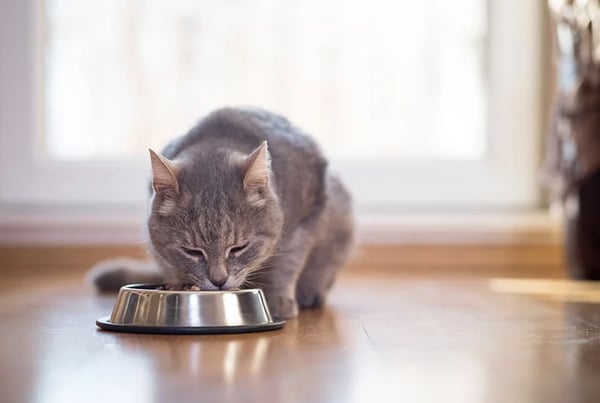
We already went over the most apparent carnivorous traits of cats, but it goes even further. How they digest their food, from teeth to tail, is designed to accommodate a meat-based diet, right down to the nutrients that their bodies can synthesize and create on their own.
Some nutrients are essential, meaning they must acquire them from their diet, while others are non-essential. They are able to make some quantities of non-essential nutrients by breaking down or synthesizing other nutrients.
Amino Acids
The most notable essential nutrient for cats is the amino acid, taurine. Taurine is vital for heart and eye health and aids in bile production, which is required for digestion.
The only food sources of taurine are meat, fish, and eggs. In a plant-based diet, synthetic, or man-made taurine must be used. We will touch more on synthetic nutrients later.
In defence of a vegan diet, most other amino acids can be sourced from plant material. Arginine, for example, is abundantly found in meat but can also be sourced from grains and legumes. The quantity and digestibility of the nutrient will vary depending on the source, but the right mix of plant ingredients should meet a cat's dietary needs of many essential nutrients.
Omega Fatty Acids
Essential fatty acids are a type of functional fat. Functional fats play a crucial role in regular bodily functions, like muscle development, hormone production, and cell cycles. Most omega fatty acids can be sourced from plants, too. Plants like flax, sunflower, and canola offer a wide variety of omega fatty acids.
So, what’s the problem?
Well, not all omega fatty acids are abundantly available from plant sources. Some are either best or only sourced from fish and fish oils. The prime example of this is DHA (docosahexaenoic acid).
Cats can synthesize DHA from another omega fatty acid called ALA (alpha-linolenic acid), found in plants, but only about 20% of ALA can be successfully converted to DHA. This means that dietary supplementation is still needed.
Though this omega 3 fatty acid is primarily sourced from fish and fish oils, it can also be found in certain types of marine algae, but not as abundantly as in fish.
Synthetic Nutrients
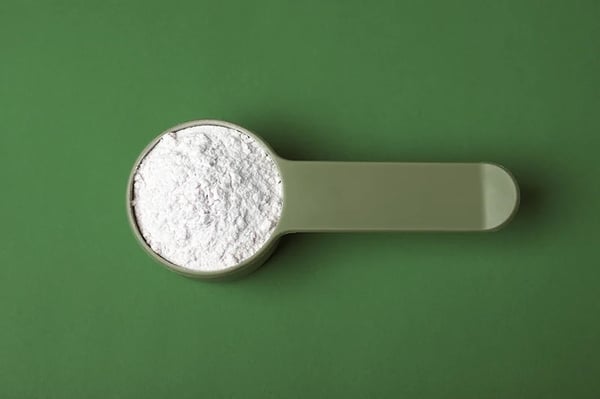
So if some nutrients can't be sourced from plants, and others can only be sourced in a limited capacity, then how can a plant-based diet meet a cat's nutritional needs?
This is where synthetic or man-made nutrients come into play. Synthetic ingredients are very commonly used in vegan pet food, and for the most part, are necessary for a processed pet diet, like kibble or canned foods, to be considered complete and balanced.
Synthetic nutrients, in most cases, provide similar levels of nutrients as their food or natural counterparts, but here’s where it gets tricky.
Some synthetic nutrients, while identical on paper, may not be perfectly equal to their food counterparts once they are processed and digested. Here are some things to consider about synthetic nutrients:
- Many synthetic vitamins and minerals are made from industrial by-products like petroleum. They are also likely to contain heavy metals, such as arsenic or lead, and carcinogenic preservatives, such as BHT or BHA.
- Many synthetic nutrients are sourced from countries with questionable ingredient and food safety standards, and man brands don't tell you where they source these ingredients.
- Vitamins and minerals from food can be easier to digest and utilize. This is because they are combined with organic materials that improve digestibility, like bioflavonoids and terpenes.
- Synthetic amino acids may be less biologically available than those from a natural source. In the case of taurine, which can only be naturally sourced from meat, a synthetic alternative may not be equivalent to the real thing.
Complete and Balanced Vegan Cat Food
Considering what we've learned, let's circle back to the original question:
Are cats omnivores?
I hope we've made it pretty clear that, no, cats are not omnivores. You can take the meat out of their diet, but you can't change their biology.
Are plant-based diets are suitable for cats?
Meeting AAFCO nutrient profiles for cats using only plant-based ingredients and synthetic nutrients is possible. Just like any other recipe, you add a little of this to buffer that, and… ta-da! You have cat food.
In an interesting article from Vecado, a vegan pet food brand, they thoroughly compared two diets, one plant-based and one meat-based. It shows many similarities in nutrient profiles. The use of synthetic ingredients was similar in both examples arguing the fact that there really isn't much difference between the nutrition in meat-based and plant-based formulas.
It also points out the harmful consequences of the meat industry, namely the slaughter of animals and the greenhouse gas emissions associated with the industry. They make a pretty compelling argument, we'll admit, but we wanted to take a run at it using a slightly different approach.
While this comparison helped show that vegan diets can meet AAFCO definitions of complete and balanced, much in the same way that many meat-based pet foods can, we did see one glaring issue with the comparison: Quality. The meat-based diet used in their comparison was subpar at best.
Much of our nutritional philosophy is based on offering the right balance of natural food ingredients to provide the best nutrition for your unique cat. While we don’t necessarily believe that a plant-based diet for cats will meet our nutritional standards, we also see many cheaply made meat-based diets that fall short, too.
Instead of using the low-quality meat-based diet used in Vecado’s article, we decided to make a comparison to a brand that fits better with our nutritional philosophy and one that has responsible farming practices.
Let us know if you can see the difference between the two breakdowns.
Plant-Based vs Meat-Based Cat Diets
|
|
Orijen Cat & Kitten |
Vecado Evolution Diet Gourmet Fondue |
|
Animal Sources |
|
N/A |
|
Plant Sources |
|
|
|
Synthetic Additives (Made in a Lab) |
N/A |
|
|
Probiotics |
|
N/A |
You’ll notice that whole, fresh, freeze-dried, or dehydrated animal ingredients, as well as carefully selected nutrient-dense plant ingredients, are capable of filling the role of the synthetic nutrients used in the vegan alternative.
Both of the diets compared meet AAFCO standards, but only one sources its nutrients entirely from real food ingredients. If this were made for humans, which would you rather put in your body?
The Takeaways

This may be an unpopular opinion, but feeding your cat a vegan diet is possible, so long as the food is nutritionally balanced using man-made nutrients to fill the gaps that animal products would typically fill.
Are they perfectly equal? In our opinion, no, but that’s not the question we are here to answer. We came to examine whether or not cats can be omnivorous.
We know that they are not omnivores, but also determined that a plant-based diet can, at least on paper, meet their basic nutritional needs.
What’s important to remember is that veganism is an inherently human choice; it’s up to you to decide whether you apply your human ideals to your pet.
Here’s an interesting perspective from a vegan advocacy website that might help provide some perspective: Vegan Cat Food: The Cold Hard Truth
If you decide to apply your vegan lifestyle to your pets, we recommend talking with your vet first and doing a lot of research when selecting a cat food brand or recipe. Some brands, like Vecado, put a lot of time and research into balancing the nutrients in their formulas, but that doesn’t apply to every formulation or recipe you find on the internet.
Nutritionally unbalanced diets can lead to serious, long-term consequences. This applies to both meat-based and plant-based cat foods. Look beyond the packaging and eye-catching claims, and dig into what’s really in your pet’s food.
Make sure you are monitoring their health closely. A vegan cat food diet may work well for some cats, while others will only thrive on a carnivorous diet. In the end, the health of your cat is the most important factor, so make decisions that keep them healthy and thriving.
Frequently Asked Questions About Cat Dietary Needs
Are cats obligate carnivores, or can they eat a variety of foods?
Cats are obligate carnivores, meaning their diet primarily consists of animal-based proteins. While they have evolved to thrive on meat, some limited plant-based foods can be included.
Can cats survive on a vegetarian or vegan diet?
Cats do not have the needed enzymes to properly utilize plant protein. Also, cats cannot naturally produce needed nutrients like taurine, which is found only in meat and vitamin A and thiamine, which are all obtained from animal tissue.
Do cats need any plant-based foods in their diet?
While cats need animal-based proteins, including small amounts of plant-based foods like fibre-rich vegetables can aid digestion and provide additional nutrients. Many commercial cat food brands regularly add vegetables and fruits to their recipes.
Can cats digest carbohydrates well?
Cats have a limited ability to digest carbohydrates efficiently. Their metabolism is better adapted to processing animal proteins and fats.
Is it okay to feed my cat only meat and no other foods?
While meat is a crucial component of a cat's diet, they also need certain vitamins, minerals, and nutrients found in plant-based foods. A balanced diet provides overall well-being. If you notice cats outdoors will often eat grass or other plant material as a nutrient supplement to their foods.
Can I give my cat fruits and vegetables as treats?
Yes, you can offer small portions of safe fruits and vegetables as occasional treats. However, ensure that these foods are safe and appropriate for cats and avoid toxic ones.
.png?width=200&height=66&name=logo%20(1).png)


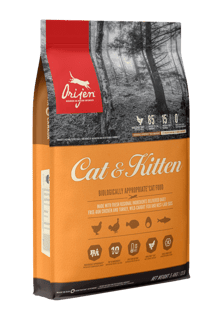
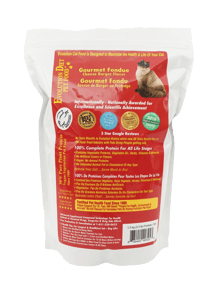
.jpg)
